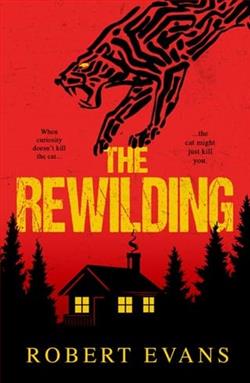Martial Peak Reviews
Robert Evans' The Rewilding is a gripping exploration of the intersection between human ambition and the untamed forces of nature. Set against the haunting backdrop of the Scottish countryside, the novel weaves a narrative that is as much a thriller as it is a cautionary tale about the consequences of playing god with nature.
The story begins with the mysterious death of a young boy, an event that serves as the catalyst for the unfolding drama. This tragedy is not just a plot device but a poignant reminder of the vulnerability of innocence in the face of human folly. The death occurs near a clandestine rewilding project, where scientists are attempting to resurrect extinct predators. This premise immediately draws parallels to Michael Crichton's Jurassic Park, where the resurrection of ancient creatures leads to unforeseen chaos. However, Evans' narrative is more intimate, focusing on the personal stakes and ethical dilemmas faced by those involved.
At the heart of the story is Steph Patel, a field biologist whose curiosity and ambition drive her into the heart of the mystery. Steph is a well-crafted character, embodying both the scientific curiosity and the moral ambiguity that often accompany groundbreaking research. Her motivations are complex; she is drawn to the story not just for the potential scientific discovery but also for the financial gain it promises. This duality makes her relatable and human, as she grapples with the ethical implications of her pursuit.
Evans does an excellent job of developing Steph's character, allowing readers to see her transformation as she delves deeper into the rewilding project. Initially driven by personal gain, Steph's journey becomes one of survival and moral reckoning as she confronts the dangerous consequences of the geneticists' work. Her evolution is both believable and compelling, making her a protagonist worth rooting for.
The supporting characters are equally well-drawn, each contributing to the novel's exploration of its central themes. The geneticists involved in the rewilding project are portrayed with nuance, their motivations ranging from scientific curiosity to hubris. Evans avoids painting them as mere villains; instead, he presents them as flawed individuals whose actions, though misguided, are driven by a genuine desire to advance human knowledge. This complexity adds depth to the narrative, prompting readers to consider the ethical boundaries of scientific exploration.
One of the novel's most striking aspects is its exploration of the theme of rewilding itself. Evans uses the concept not just as a plot device but as a metaphor for the broader human tendency to manipulate and control nature. The rewilding project in the novel serves as a microcosm of humanity's ongoing struggle to balance technological advancement with ecological preservation. Through the narrative, Evans raises important questions about the consequences of disrupting natural ecosystems and the moral responsibility that comes with scientific innovation.
The setting of the Scottish countryside adds an atmospheric layer to the story, its rugged beauty contrasting with the underlying tension of the plot. Evans' descriptive prose brings the landscape to life, immersing readers in a world where nature is both breathtaking and perilous. This vivid setting enhances the novel's suspense, as the isolation of the countryside amplifies the sense of danger and urgency faced by the characters.
In terms of pacing, The Rewilding is a well-balanced thriller that maintains tension throughout. Evans skillfully alternates between moments of quiet introspection and high-stakes action, keeping readers engaged from start to finish. The novel's climax is both satisfying and thought-provoking, leaving readers with lingering questions about the ethical implications of the story's events.
Comparatively, The Rewilding shares thematic similarities with other works that explore the consequences of scientific hubris, such as Mary Shelley's Frankenstein and Margaret Atwood's Oryx and Crake. Like these classics, Evans' novel serves as a cautionary tale about the dangers of unchecked ambition and the ethical dilemmas inherent in scientific progress. However, Evans' focus on the personal stakes and character development sets his work apart, offering a fresh perspective on these enduring themes.
Overall, The Rewilding is a compelling and thought-provoking read that will appeal to fans of both thrillers and speculative fiction. Robert Evans has crafted a narrative that is not only entertaining but also intellectually engaging, prompting readers to reflect on the complex relationship between humanity and the natural world. With its well-developed characters, atmospheric setting, and timely themes, The Rewilding is a novel that resonates long after the final page is turned.
























Reviews 0
Post a Reviews: